- Home
- Chris Grabenstein
Mr. Lemoncello's Library Olympics Page 3
Mr. Lemoncello's Library Olympics Read online
Page 3
“Wow,” said Miguel. “Do you think Rick Riordan’s going to be here? That would be so awesome!”
All the animated action was displayed on ten wedge-shaped high-definition video screens—as luminous as any sports arena’s scoreboard. They lined the underbelly of the building’s colossal cathedral ceiling like glowing slices of pie. Each screen could showcase individual images or join with the other nine to create one spectacular presentation.
“Whoa,” said Akimi. “Check out the statues. They’re hardly wearing any clothes.”
“And,” Sierra said, “they look like they’re made out of marble.”
“Right,” said Akimi. “See-through marble.”
Tucked beneath the ten Wonder Dome screens in arched niches were ten 3-D statues glowing a ghostly green. Holograms.
“They all remind me of Hercules,” said Kyle, taking in the dizzying array of muscular wrestlers, javelin throwers, discus flingers, and runners. “Except for the lady with the horse.”
“I think that’s a Spartan princess named Cynisca,” said Sierra, who read a ton of history books, too. “She won the four-horse chariot race in 396 BC and again in 392 BC in what we call the ancient Olympic Games.”
Akimi arched an eyebrow. “You sure she isn’t that girl from The Girl Who Loved Wild Horses?”
Sierra laughed. “Positive!”
“Splendiferous greetings and salutations to one and all!” boomed Mr. Lemoncello’s voice from the loudspeakers as the trumpets blared their final fanfare. “Thank you for joining us this evening. It is now time for my big, colossal, and jumbo-sized announcement!”
Kyle held his breath and crossed his fingers.
He really hoped he and his friends were going to star in more commercials.
Being famous was fun.
And kind of easy, too.
Blazing circles of bright light swung across the second-floor balcony to shine on Mr. Lemoncello.
Spotlights following him, he scampered to the nearest spiral staircase, slid down the banister, and dismounted with an impressive backflip. When his boot heels hit the ground, they squawked like a chicken, then mooed like a cow.
“Dr. Zinchenko? Kindly remind me never to borrow boots from Old MacDonald again.”
Mr. Lemoncello wore a bright red and blue Revolutionary War outfit with a ruffled collar and a cape. A plumed tricorne hat completed the costume. He pulled out a brass handbell and rang it. Loudly.
“Welcome, boys and girls, families and friends, esteemed members of the press.”
Mr. Lemoncello smiled for all the television cameras aimed at him.
“Clarence? Clement?” He clanged his bell a few more times. “Please bring in today’s mail.”
Clarence and Clement, the beefy twins who headed up security for the Lemoncello Library, marched into the Rotunda Reading Room flanked by six robotic carts loaded down with United States Postal Service mail bins.
“Dr. Zinchenko? How many emails have we received on this same subject?”
Dr. Zinchenko consulted the very advanced smartphone clipped to the waistband of her bright red pantsuit. “Close to one million, sir.”
“One million?” Mr. Lemoncello shuddered. “And that’s just the bad beginning. But, not to worry, I have come up with the happy ending! You see, fellow library lovers, kids all across this wondermous country are eager to prove that they are bibliophilic champions, too. Therefore, oyez, oyez, and hear ye, hear ye.”
Kyle covered his ears. Mr. Lemoncello was clanging his bell like crazy.
“Let the word go forth from Alexandriaville to all fifty states. I, Mr. Luigi L. Lemoncello, master game maker extraordinaire, am proud to announce a series of games that will rekindle the spirit and glory of the ancient Olympic Games held, once upon a time, in Olympia—the one in Greece, not the capital of Washington State. Therefore, I hereby proclaim the commencement of the first-ever Library Olympics! A competition that will discover, once and for all, who are this sweet land of liberty’s true library champions. Dr. Zinchenko?”
“Yes, Mr. Lemoncello?”
“Kindly invite your network of crackerjack librarians all across this country to organize regional competitions.”
“Immediately, sir.”
“Oh, it can wait until tomorrow. I, of course, will pay for everything, including the Cracker Jacks.”
“Of course, sir.”
“Bring me your best and brightest bookworms, research hounds, and gamers. Our first Library Olympiad shall commence on March twentieth. The ancient Greeks had their summer games, so we’ll take the first day of spring.”
“How many members should be on each team?” asked Dr. Zinchenko, who was furiously tapping notes into her tablet computer.
“Five,” said Mr. Lemoncello, “the same number as on Team Kyle. Our hometown heroes are hereby officially invited to these Library Olympics, where they will defend their crown—which, to keep things Greek and chic, will be made out of olive branches.”
Kyle gulped.
Another competition?
Against the top library nerds in the country?
He didn’t like the sound of that. He liked being a champion and staying a champion.
“Um, sir?” said Miguel, raising his hand.
“Yes, Miguel?”
“Haley Daley moved to Hollywood. We’re down to four.”
“What about Andrew Peckleman?” asked Mr. Lemoncello. “He only cheated in the first game because someone who shall remain nameless bullied him into doing it.”
Mr. Lemoncello pretended to cough, but his cough sounded a lot like “Ch-arles Ch-iltington.”
“Andrew won’t play,” said Miguel. “He says he hates libraries.”
“Oh, my. Well, we must certainly work on changing that. For now, we will stick with four members on every team. Just like the four horses pulling that Spartan lady Cynisca’s chariot.”
Yep, thought Kyle. Sierra was right. Again.
“Once we find our other Library Olympians,” said Mr. Lemoncello, “we’ll fly them here to Alexandriaville and commence our duodecimalthon.”
“Your what?” asked Akimi.
“Duodecimalthon. It’s like a decathlon, only with twelve games instead of ten.”
“Why twelve?” asked Kyle, who was already trying to figure out how many games his team would need to win to keep its title.
“Because ‘duodecimalthon’ sounds a lot like ‘Dewey decimal system’ if you say it real fast with a mouthful of malted milk balls, don’t you agree?”
“Yes, sir.”
“Good,” said Mr. Lemoncello, raising his bell and striking a heroic pose. “The four members of the winning team shall each receive a full scholarship to the college of their choice.”
The audience applauded. Some parents even whistled.
“That’s right. It’s very whistle-worthy. The winners will receive four years of paid tuition plus free room, board, and books. Lots and lots of books. Now go find me my champions!”
Dr. Zinchenko went to work with her book- and game-loving librarian colleagues in all fifty states.
The country was divided up into seven regions: Midwest, Northeast, Mid-Atlantic, Southeast, Southwest, Mountain, and Pacific. Since the Library Olympics would be held to see if any team could dethrone the stars of Mr. Lemoncello’s holiday commercials, only children in middle school, like the four members of Team Kyle, were allowed to participate.
Throughout January and February, thousands of eager contestants flocked to their local libraries to play the same kind of Dewey decimal scavenger-hunt game that had been at the heart of the Escape from Mr. Lemoncello’s Library game.
In Decatur, Georgia, a girl named Diane Capriola advanced to the Southeast semifinals when she worked her way out of an Atlanta–Fulton County public library before anybody else by solving a riddle: “What occurs once in every minute, twice in every moment, yet never in a thousand years?”
“The answer, of course, is the letter ‘M,’ ” Diane tol
d local TV reporters. “So, I went to the reference section, opened up the ‘M’ encyclopedia, and—ta-da—there was a key to the back door tucked inside! When I stepped out to the sidewalk, the librarians were waiting with balloons and cake. It was easy-peasy.”
In California, a boy named Pranav Pillai became a finalist for the Pacific team after he correctly deciphered that 683.3, the Dewey decimal code for Louie the Locksmith’s Big Book of Padlocks, Dead Bolts, and Tumblers, was also the combination for the lock securing the exit of the Los Altos Public Library: 6-R, 8-L, 3-R, 3-L.
But the player librarians all over the country were raving about most was Marjory Muldauer from Bloomfield Hills, Michigan. A gangly seventh grader, a foot taller than any of her competitors, Marjory Muldauer had memorized the ten categories of the Dewey decimal system before she entered preschool.
The books in her bedroom were all organized by numbered codes. So were the spices in her mother’s kitchen cabinets. And the baby food jars filled with nuts and bolts in her father’s garage.
Marjory liked organizing things.
She knew her way around a library better than the robotic carts in Mr. Lemoncello’s library. She read six books a day and could do two crossword puzzles at once—with a ballpoint pen.
“I’m glad that Mr. Lemoncello read my several letters and launched these Library Olympics,” Marjory told a reporter from her hometown newspaper. “I could really use that college scholarship he’s giving away. I’m also glad that the libraries where I’ve competed thus far have based their scavenger hunts on good old-fashioned research techniques. It’s too bad that so many of the kids who signed up for the competition see these games as some kind of party.”
“What do you mean?” asked the reporter.
“Mr. Lemoncello insists that everybody be given balloons and cake. Cake has no place in a library. Frosting is sticky. Sticky fingers damage books.”
“But Mr. Lemoncello is also a great lover of libraries.”
“Is he?” said Marjory skeptically. “I don’t think Mr. Lemoncello loves libraries qua libraries.”
“Huh?” said the reporter. “What does ‘qua’ mean?”
“ ‘As.’ It’s Latin. Mr. Lemoncello does not love libraries as libraries. He thinks they need to be tricked out with gadgets and gizmos and holographic displays. That library in Ohio reminds me of Disneyland with a few books. I think Mr. Lemoncello is seriously immature. He probably still believes in three-nine-eight-point-two.”
“Huh?” The reporter was confused again.
“Three-nine-eight-point-two!” said Marjory. “It’s the Dewey decimal number for fairy tales.”
The reporter just nodded and closed her notepad.
Marjory Muldauer had that effect on people.
“Wait,” Marjory told the reporter. “I’m not finished. Be sure you write this down: Kyle Keeley? You don’t stand a chance in France!”
“Andrew used to be your friend,” Kyle said to Miguel. “Maybe you could talk him into taking my place.”
Kyle and Miguel were hanging out in the cafeteria, waiting for Sierra and Akimi to join them for their daily team meeting, something they’d been holding ever since Mr. Lemoncello announced his Library Olympics idea back in January.
“No way, bro,” said Miguel. “We need you.”
“No, you don’t.”
“You’re our leader. El capitán.”
“But I shouldn’t be. Sure, I know how to play games. But I’m still not great at all the library stuff.”
“And I’m not very good at games,” said Miguel. “And I haven’t read half as many books as Sierra. And I’m nowhere near as clever as Akimi. The team needs all four of us, bro.”
“But have you seen some of these kids in the regional competitions? They’re amazing.”
“Yeah. That girl Marjory up in Michigan sure knows her way around the stacks.”
“That’s why you guys need Andrew Peckleman. He used to be your second-in-command on the library squad.”
“I already told you: Ever since he was booted out of the escape game, Andrew Peckleman does not like libraries. Besides, he can’t practice with us after school, because he has a new job.”
“What kind of job?” asked Kyle.
“He’s working afternoons and weekends at the motel that opened up last month across from Liberty Park. Some distant relative that Andrew and his parents didn’t even know they had owns the place. A great-uncle-twice-removed or something. He hired Andrew.”
“Even though he’s only twelve?”
Miguel shrugged. “I guess when it’s family, it’s different.”
“What’s Andrew do?”
“Sweeps. Makes sure the ice machine isn’t clogged. Fills the bird feeders.”
“Bird feeders?”
“What can I say? Andrew’s uncle must love birds. He even named his motel the Blue Jay Extended Stay Lodge. Come on. Forget Andrew. We’re counting on you.”
That was the problem. Kyle didn’t want to let his friends down. And he’d read Marjory Muldauer’s interview with her hometown newspaper online.
She was gunning for Kyle.
Kyle so wished he could switch places with Andrew, even if it meant sweeping up birdseed.
He hadn’t told any of his teammates, but in the six weeks since Mr. Lemoncello had announced his Library Olympic Games, Kyle felt a nervous fluttering in his stomach every time he played a board game against his brothers or fielded a riddle tossed at him by a school bus driver.
The pressure was intense.
Especially since Kyle had been on something of a losing streak—something else he hadn’t told Miguel or Akimi or Sierra. He hadn’t beaten his brothers on family game night once since January. Kyle had even lost the home version of the Escape from Mr. Lemoncello’s Library board game—to his mom. And Miguel had been playing with Kyle that time. True, Miguel had given Kyle some bad advice. (Flubber is the name of a Walt Disney movie starring Robin Williams, not a book by Judy Blume, which would be Blubber.) But Kyle was the one who had given the wrong answer.
The first game in Mr. Lemoncello’s library had been more like a scavenger hunt, something Kyle was good at. But these new Olympic Games were going to be about serious library topics, and Kyle would be playing against some serious library whiz kids.
Akimi and Sierra came into the otherwise empty cafeteria.
“Hey, guys,” said Akimi. “Sorry we’re late.”
“Akimi was teaching me how to play that new Lemoncello video game where you squish all the different-colored jelly beans with a sledgehammer,” said Sierra. “I made it to level three.”
Kyle nodded. “Jujitsu Jelly Jam.”
He didn’t mention that he’d already made it to level fifty-three. Friends didn’t gloat to friends.
“So what’re we doing today?” asked Akimi. “More rebus puzzles? Dewey decimal drills?”
“First things first,” said Miguel, jerking his thumb at Kyle. “Our fearless leader here is getting cold feet.”
“Wha-hut?” said Akimi.
“Kyle wants to quit.”
“I didn’t say I want to quit, Miguel.”
“Right. You just said you didn’t want to be on the team anymore. That you wanted Andrew Peckleman to take your place.”
“Which,” said Akimi, “basically means you want to quit.”
“I’m not a quitter,” said Kyle.
“Uh, yes, if you quit, you are,” said Akimi. “Sierra, correct me if I’m wrong.”
“Sorry, Kyle,” said Sierra. “That’s the dictionary definition of ‘quitter,’ all right. ‘A person who quits or gives up easily, especially in the face of some difficulty or danger.’ ”
“Snap,” said Miguel. “Sierra just gave you the four-two-three on quitters.”
Kyle was confused. “The what?”
“The four-two-three,” said Akimi. “That’s where you can always find a dictionary of standard English in a library.”
“Oh,” said Kyle.
“Did not know that.”
“It was on last week’s study sheet,” said Miguel.
“Right. Sorry. Guess I should’ve studied it.”
“Well, duh,” said Akimi. “That’s why we call them study sheets.”
Kyle pretended to laugh, but deep down, he knew the truth: No matter how hard he tried, he would never be able to win every single game he played for the rest of his life. Sometimes the cards and the dice and the questions just didn’t go your way. Every chance for victory was another chance for defeat.
He didn’t belong in anybody’s Library Olympics.
Playing off the NCAA basketball tournament’s “March Madness” theme, Mr. Lemoncello declared the first Saturday in March “Library Lunacy Day.”
It was time for each of the seven regions to make its toughest cuts and choose the four members for its Library Olympics team.
At two p.m. Eastern Standard Time (eleven a.m. on the West Coast), Mr. Lemoncello himself addressed all the contestants via a video conference call. He wore a bright yellow shirt with a custom-cut tie shaped like a cello.
“Hearty and splendiferous congratulations on having made it this far in the competition. I wish I could invite each and every one of you plus everybody else in America to my first-ever Library Olympic Games, but, unfortunately, Ohio fire codes do not permit occupancy by more than three hundred and twenty-five million people, even if they are all little women. Good luck! Have fun! And remember, books are the true breakfast of champions! You may devour them. But please don’t eat them. Thank you.”
In California, where all sixteen finalists were library whizzes, Sarah Trager Logan, the librarian in charge, knew teamwork would be crucial for victory inside the Lemoncello Library. That’s why she made all sixteen finalists participate in a synchronized book-cart drill. It was judged by the same Hollywood celebrities who judge TV dancing shows.
In Colorado, the four members of the Mountain team would be the first four students who could solve one final puzzle. All the top contestants were given a sheet of paper with the following paragraph printed on it:

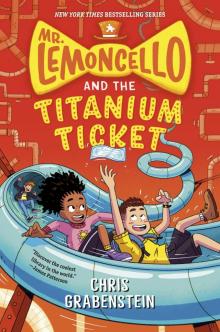 Mr. Lemoncello and the Titanium Ticket
Mr. Lemoncello and the Titanium Ticket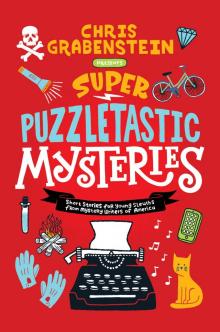 Super Puzzletastic Mysteries
Super Puzzletastic Mysteries Sandapalooza Shake-Up
Sandapalooza Shake-Up Welcome to Wonderland #4
Welcome to Wonderland #4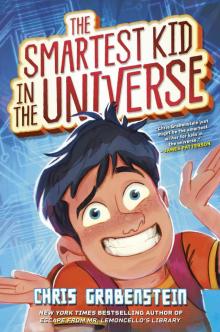 The Smartest Kid in the Universe
The Smartest Kid in the Universe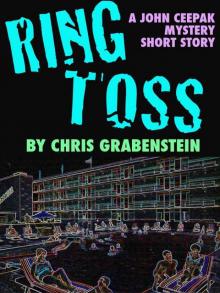 RING TOSS A John Ceepak Mystery Short (The John Ceepak Mysteries)
RING TOSS A John Ceepak Mystery Short (The John Ceepak Mysteries)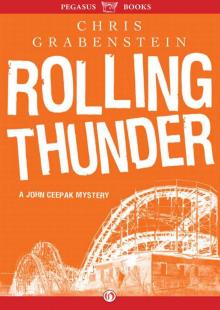 Rolling Thunder (John Ceepak Mystery)
Rolling Thunder (John Ceepak Mystery) Don't Call Me Christina Kringle
Don't Call Me Christina Kringle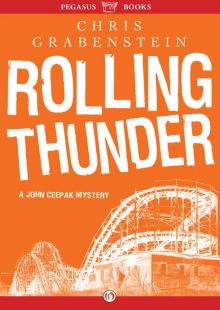 Rolling Thunder
Rolling Thunder The Crossroads
The Crossroads Hell Hole
Hell Hole Beach Party Surf Monkey
Beach Party Surf Monkey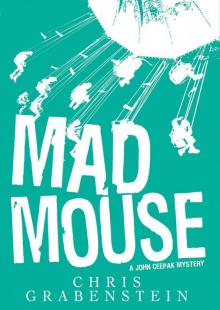 Mad Mouse: A John Ceepak Mystery (The John Ceepak Mysteries)
Mad Mouse: A John Ceepak Mystery (The John Ceepak Mysteries) Mind Scrambler
Mind Scrambler Home Sweet Motel
Home Sweet Motel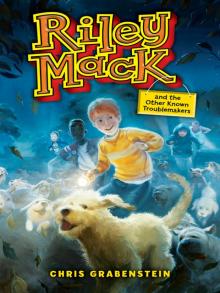 Riley Mack and the Other Known Troublemakers
Riley Mack and the Other Known Troublemakers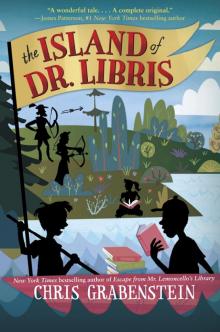 The Island of Dr. Libris
The Island of Dr. Libris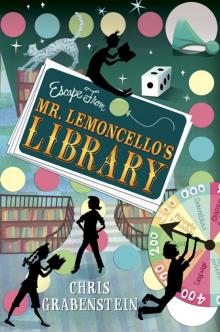 Escape From Mr. Lemoncello's Library
Escape From Mr. Lemoncello's Library The Black Heart Crypt
The Black Heart Crypt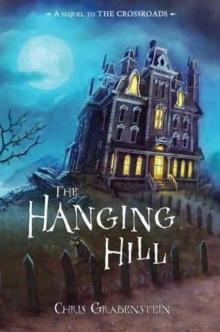 The Hanging Hill
The Hanging Hill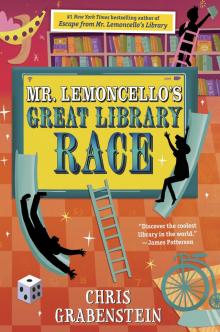 Mr. Lemoncello's Great Library Race
Mr. Lemoncello's Great Library Race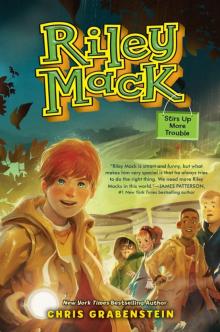 Riley Mack Stirs Up More Trouble
Riley Mack Stirs Up More Trouble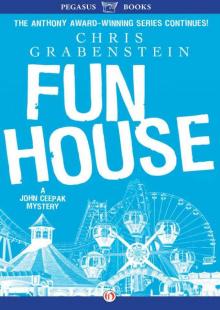 Fun House (John Ceepak Mystery)
Fun House (John Ceepak Mystery) Whack A Mole: A John Ceepak Mystery (The John Ceepak Mysteries)
Whack A Mole: A John Ceepak Mystery (The John Ceepak Mysteries)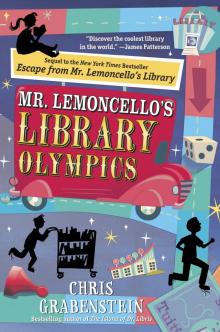 Mr. Lemoncello's Library Olympics
Mr. Lemoncello's Library Olympics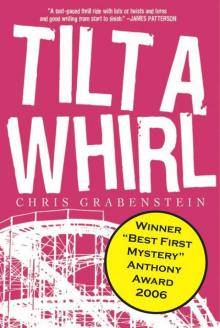 Tilt-a-Whirl jc-1
Tilt-a-Whirl jc-1 The Explorers’ Gate
The Explorers’ Gate The Smoky Corridor
The Smoky Corridor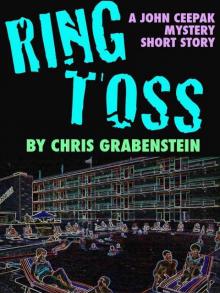 Ring Toss (john ceepak)
Ring Toss (john ceepak) Whack A Mole jc-3
Whack A Mole jc-3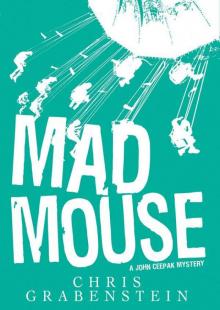 Mad Mouse js-2
Mad Mouse js-2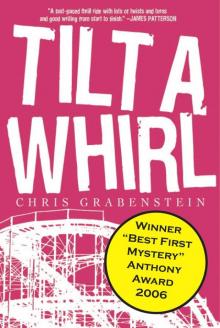 Tilt-a-Whirl (The John Ceepak Mysteries)
Tilt-a-Whirl (The John Ceepak Mysteries) Free Fall
Free Fall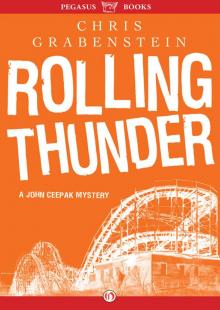 Rolling Thunder jc-6
Rolling Thunder jc-6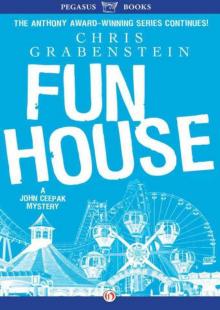 Fun House jc-7
Fun House jc-7